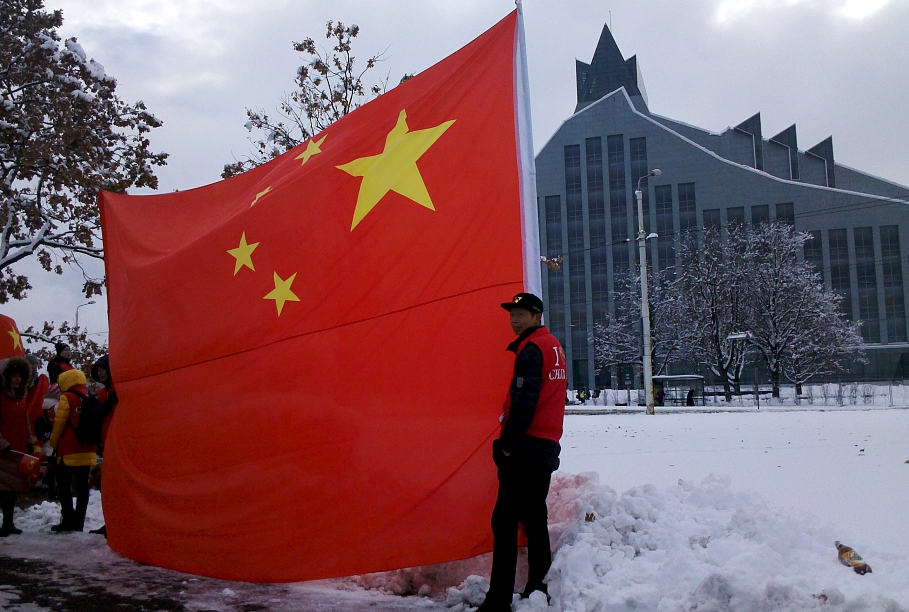The Chargé d’Affaires ad interim of the Embassy of China in Latvia, Song Danhui, was summoned to a meeting "to provide explanations" according to a release from the Ministry.
"During the conversation, the Director of the Second Bilateral Relations Directorate at the Ministry of Foreign Affairs, Samija Šerifa, indicated that the statements of China’s Ambassador to France questioning the “effective status in international law” of certain countries were utterly unacceptable to Latvia," the Ministry said.
"Samija Šerifa noted that the international community had unequivocally recognized the sovereignty and territorial integrity of the countries that gained their independence upon the break-up of the Soviet Union. Aggression by the Russian Federation in breach of Ukraine’s sovereignty and territorial integrity is a blatant violation of international law.
"Samija Šerifa also drew attention to the fact that the Baltic States were illegally occupied and annexed while they continued to exist de iure as sovereign states; accordingly, they have never been Soviet states despite their de facto incorporation in the Soviet Union," the statement added.
Such statements as those made by Lu Shaye were "not conducive to further EU-China dialogue," the Ministry said.
After the original comments sparked uproar in the Baltic states and beyond, China has put some effort into walking them back. Chinese Foreign Ministry spokesperson Mao Ning said April 24: "The Soviet Union was a federal state and as a whole was one subject of international law in international relations. This does not negate the republics’ status as sovereign countries after the Soviet Union’s dissolution."
"China respects all countries’ sovereignty, independence and territorial integrity and upholds the purposes and principles of the UN Charter. After the Soviet Union dissolved, China was one of the first countries that established diplomatic ties with the countries concerned. Since the establishment of diplomatic ties with these countries, China has followed the principles of mutual respect and equality in developing friendly and cooperative bilateral relations with them. China respects the status of the former Soviet republics as sovereign countries after the Soviet Union’s dissolution," said Mao Ning.
However, the repetition of the words "former Soviet republics" is unlikely to soothe the Baltic states much. Officials have been at pains to point out that the existence of their states as independent entities pre-dates the establishment of the Soviet Union, into which they were forcibly annexed, giving the Soviet period the status of a lengthy occupation by a foreign power.
Some points pro memoria
— Edgars Rinkēvičs (@edgarsrinkevics) April 24, 2023
Latvia was illegally occupied by the Soviet Union in 1940
International community has never recognised the Soviet occupation
We restored our independence in 1991
The Baltic states are not and never been “post Soviet nations”
Lithuania and Estonia both said they had also summoned Chinese diplomats Monday for the same reason.
The MFA of 🇱🇹 summoned Qu Baihua, China’s acting chargé d’affaires, and expressed its strong protest over the remark by the Chinese Ambassador to France on 22 April that the so-called ‘former Soviet countries’ had no actual status in international law ▶️ https://t.co/zbNrvb3PGm pic.twitter.com/OKb7d2YLI0
— Lithuania MFA | #StandWithUkraine (@LithuaniaMFA) April 24, 2023
Today we summoned Meng Jianhua, the Chargé d’Affaires of the Chinese embassy to object to the claims made by Chinese Ambassador to #France Lu Shaye that questioned the sovereignty of former Soviet states and Crimea being part of #Ukraine.
— Estonian MFA 🇪🇪 | 🌻 #StandWithUkraine (@MFAestonia) April 24, 2023
Read in full:👉 https://t.co/gBgckfGd32




























